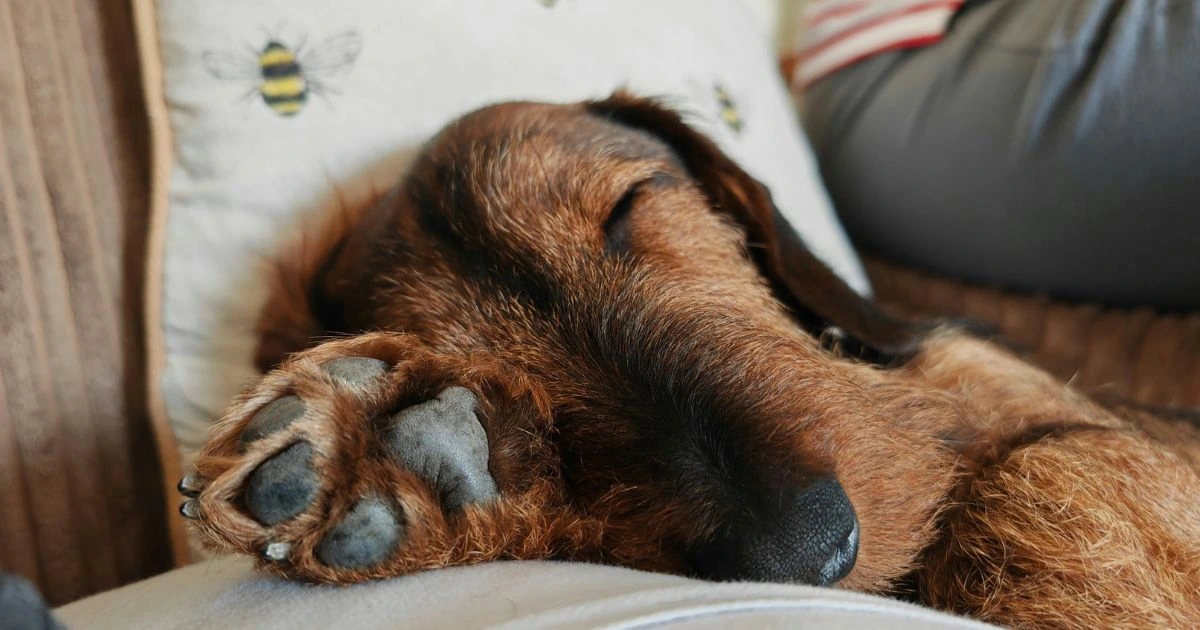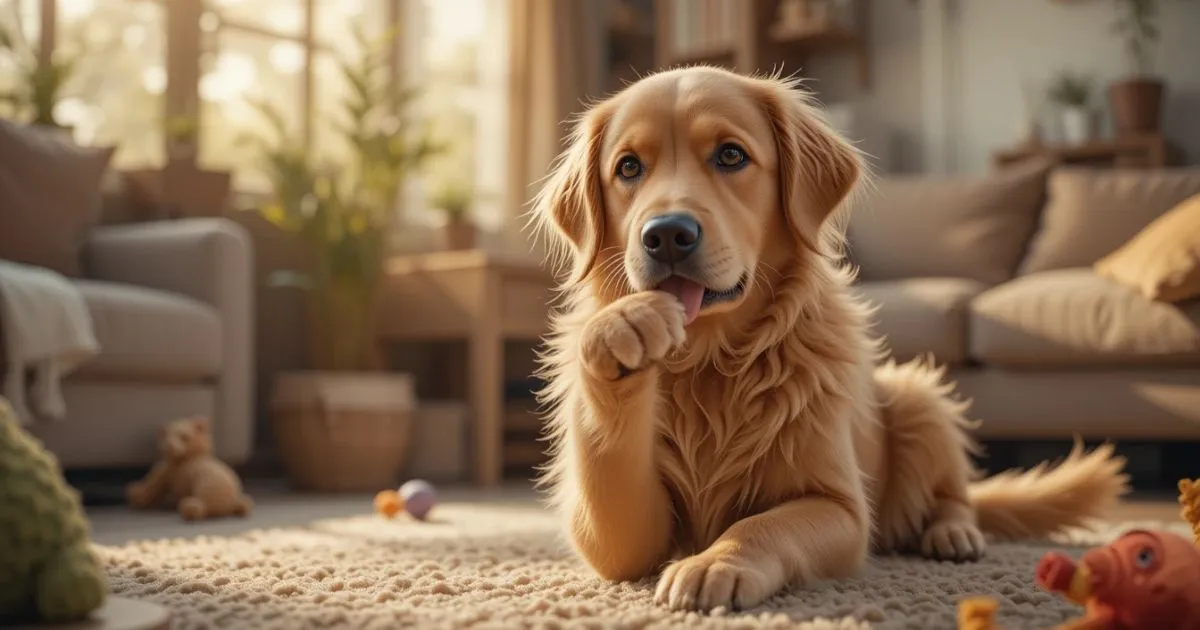As a devoted pet owner, you’ve seen your furry friend lick and chew their paws. Some paw chewing is normal, but too much can mean there’s a problem. It’s important to find out why and fix it to keep your dog’s paws healthy.
Dogs chew their paws for many reasons, from grooming to serious health issues. Things like allergies, injuries, and skin infections can cause them to chew more. Knowing why they chew can help you stop it and keep them comfortable.
In this guide, we’ll explore why dogs chew their paws too much. You’ll learn how to handle it, whether it’s just grooming or a bigger issue. With the right knowledge, you can keep your dog’s paws happy and healthy.
Table of Contents
Understanding Normal vs. Excessive Paw Chewing
Paw chewing is common in dogs. It’s key to know when it’s normal and when it’s a sign of a problem. Regular paw licking is how dogs keep their paws clean. But, if it gets too much, it might mean there’s something wrong.
Signs of Normal Grooming Behavior
Dogs usually lick or chew their paws for a short time. This happens after they’ve been active or napping. Their paws should look clean and healthy, with no signs of irritation.
When Paw Chewing Becomes Problematic
But, if a dog keeps chewing their paws too much, it can cause big problems. This can lead to pododermatitis, a skin infection. It can make their paws red, swollen, and even cause sores that hurt a lot.
Warning Signs to Watch For
If your dog keeps licking or chewing their paws, even when you try to distract them, it’s a red flag. Also, if they limp or don’t want to walk, it’s time to check things out. Excessive paw chewing can mean allergies, injuries, skin infections, or even behavioral issues.
It’s important to know when your dog’s paw chewing is normal and when it’s not. By watching for signs and acting fast, you can keep your dog’s paws healthy and happy.

Common Medical Causes of Dog Chewing Paws
If your dog is chewing their paws a lot, finding the medical reason is key. Issues like allergies, injuries, infections, and physical conditions can cause this. Knowing the cause helps treat your dog’s problem effectively.
Allergies are a common problem. Dogs can react to food, seasonal allergens, or household items. This can make their paws itch and swell, leading to chewing and licking.
Injuries, like cuts or stings, can also make dogs chew their paws. Conditions like arthritis or nail injuries can be painful. Dogs may lick and chew to feel better.
- Bacterial and fungal infections, like pododermatitis, can make paws itch and swell.
- Frostbite, contact dermatitis from ice melt, and other skin issues can also cause chewing.
- Psychological factors like boredom, stress, or separation anxiety can make dogs chew their paws too.
If your dog is chewing their paws, see a vet to find out why. They can help figure out the cause and treat it. This can make your dog feel better and stop the chewing.
Allergies and Environmental Triggers
Allergies often cause dogs to chew their paws too much. Different things can make your dog itchy and uncomfortable. Knowing what allergies your dog might have is important to stop the paw chewing.
Food Allergies and Sensitivities
Some dogs are allergic to proteins like chicken or beef. These allergies can start at any time and make your dog chew their paws a lot. Finding out what protein is causing the problem is the first step to help your dog.
Seasonal and Environmental Allergens
Environmental allergies, or atopy, also make dogs chew their paws a lot. Pollen, grass, and dust mites can make your dog itchy. These allergies usually start when a dog is between 6 months and 3-4 years old.
Household Product Reactions
Even things in your home can make your dog allergic. Laundry detergents, floor cleaners, or even their bedding can cause skin problems. Getting rid of these irritants is important to help your dog.
Dealing with allergies and environmental triggers is key to stopping your dog’s paw chewing. Talk to your vet to find the best treatment. This might include medicine, special food, or changes in your home to keep your dog happy and healthy.
“One of the main reasons for persistent paw chewing in dogs is allergies..”
Injuries and Physical Conditions
Pet owners need to watch out for dog paw injuries and physical issues. Cuts, burns, or objects stuck in their paws can hurt a lot. Arthritis in older dogs can also cause pain and make them lick their paws too much. Even cold weather can cause frostbite.
Nail injuries, especially to the quick, are very painful for dogs. They might chew on their paws a lot because of this.
But, most paw injuries and conditions can be treated well. This might include wound care, pain relief, and sometimes surgery. Working with your vet can help your dog feel better and avoid more problems.
It’s important to protect your dog’s paws and deal with any injuries or conditions quickly. This helps keep them happy, healthy, and stops them from chewing their paws too much.
“Paw care is essential for the overall well-being of our canine companions. Addressing injuries and physical conditions promptly can make a world of difference in their comfort and quality of life.”
Infections and Skin Conditions
Dog paw chewing often stems from infections and skin issues. Bacterial and fungal infections, like yeast, are common. Pododermatitis, or paw inflammation, can also occur and needs special treatment.
–Bacterial and Fungal Infections
Skin problems are a top reason for dogs chewing their paws. Environmental allergies, such as to grass and pollen, can cause this. Some breeds, like bulldogs and goldendoodles, are more likely to have these allergies.
Food allergies can also make dogs chew their paws. Common culprits include dairy, beef, soy, and gluten. Yeast infections, often missed, can also lead to paw chewing.
Dogs in humid areas and those with allergies are more at risk for fungal infections. Outgoing dogs are more likely to get cuts and scrapes, leading to bacterial infections. Staphylococcus is a common bacteria found in dog paws.
Pododermatitis Treatment Options
Treatment for paw infections may include topical or oral meds, medicated washes, and addressing the cause. Antifungal and antibiotic meds, vet exams, and paw soaks are often needed. Topical treatments and anti-inflammatory meds can also help.
Changing the environment to reduce allergens is also important. Proper wound care is crucial for healing.
When to Seek Veterinary Care
If your dog’s paw chewing doesn’t stop or gets worse, seek vet care. Look for signs like pain, swelling, or unusual discharge. Chronic or recurrent chewing, or trouble stopping the dog from licking, are red flags.
Regular care and paw maintenance can prevent infections. This proactive approach is key to keeping your dog’s paws healthy.
Behavioral and Psychological Factors
Medical conditions and environmental triggers can cause dog paw chewing. But, behavioral and psychological factors also play a big role. Anxiety, boredom, and stress can make dogs lick their paws compulsively. Separation anxiety is a big one, especially when dogs are left alone.
Other signs of stress include restlessness, panting, and destructive actions. These are often seen in dogs with dog anxiety and paw chewing. It’s important to find and fix the root causes of these issues.
Treating Behavioral Causes
Fixing behavior-driven paw chewing needs a few steps:
- Behavior modification, like desensitization and counter-conditioning, helps dogs deal with anxiety and stop compulsive behaviors.
- More mental and physical activities, like interactive toys and training, help with boredom and excess energy.
- In some cases, a vet might prescribe anti-anxiety meds to help with severe issues.
By tackling the psychological reasons behind dog paw chewing, owners can help their dogs overcome this annoying habit.
“Addressing the behavioral and psychological drivers behind paw chewing is just as important as treating any medical conditions. A holistic approach is key to helping dogs break this cycle of discomfort and compulsive behavior.”
Prevention and Home Care Strategies
It’s important to keep your dog’s paws healthy to stop them from chewing too much. Simple steps can help fix the problem and keep your dog comfortable.
Regular Paw Maintenance
Make a habit of checking and grooming your dog’s paws often. This means:
- Trimming nails to avoid discomfort
- Cleaning between the toes to remove dirt and irritants
- Looking for injuries, infections, or skin problems
- Using paw wax or balm to keep the pads moist and protected
Environmental Modifications
Change your dog’s environment to lessen paw grooming issues. You can:
- Use pet-safe ice melt in winter to avoid paw irritation
- Provide soft surfaces for dogs with joint pain or arthritis
- Keep your home free of harmful cleaners or chemicals
Protective Measures
Protective gear can help keep your dog’s paws safe and prevent chewing or licking. You can use:
- Paw wax or balm for protection against harsh weather
- Dog booties or socks to shield paws from hot or cold surfaces
- Keeping nails trimmed to avoid discomfort and injuries
Combining regular care, environmental changes, and protective gear can help a lot. By being proactive, you can keep your dog’s paws comfortable and prevent excessive chewing.
Treatment Options and Professional Solutions
If your dog is chewing their paws too much, finding the cause is key. Your vet might suggest treatments like creams, pills, or behavior changes. This depends on why your dog is chewing their paws.
For issues like infections or allergies, your vet might give creams or pills. Omega-3 fatty acids in supplements can help with skin health and itching. If your dog has injuries or arthritis, they might need pain relief to stop chewing.
Behavioral problems like anxiety or compulsive disorders might need special help. Your vet could suggest changes in your dog’s environment or refer you to a behaviorist. They can create a plan to tackle emotional or mental issues.
For more serious cases, your vet might suggest allergy tests or special diets. In some cases, a vet dermatologist is needed for advanced care. This is to manage allergies and skin conditions.
It’s important to work with your vet to find the best treatment for your dog. With the right plan, your dog can feel better and avoid more problems.
“Identifying and addressing the underlying cause is key to successfully treating paw chewing in dogs. Working closely with your veterinarian can help ensure your pet receives the appropriate care and support.”
Conclusion
It’s important to understand why dogs chew their paws. Some reasons, like environmental triggers or minor injuries, can be fixed at home. But, if your dog’s paw chewing doesn’t stop, you should see a vet.
Conditions like allergies, infections, and behavioral issues need a vet’s help. They can find the cause and give the right treatment.
Keeping your dog’s paws clean and watching for signs of trouble is key. If you see any issues, act fast. This can stop small problems from getting worse.
By fixing the real reason for your dog’s paw chewing, you can make them feel better. They’ll be able to live a happy and healthy life.
To keep your dog’s paws healthy, use a mix of home care, lifestyle changes, and vet help. Always watch for signs of trouble and work with your vet. This way, you can keep your dog’s paws in the best shape.
